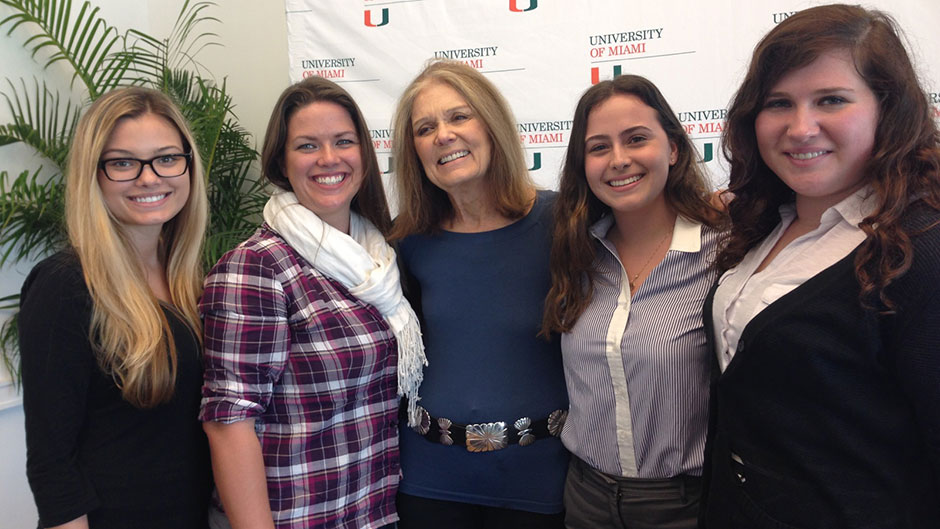As she sat down for an interview with student journalists in the Student Activities Center, Gloria Steinem told the four young women she would rather be sitting among them asking the questions.
Addressing a packed ballroom of admirers shortly afterward, Steinem expressed her discomfort with the title of the talk that brought her to the University of Miami campus Tuesday afternoon—A Leader’s View of the Modern Women’s Movement. After all, she said, we all have something to contribute and can find the issues that need “consciousness raising” by reading the newspaper.
“Just pick up any thread wherever you are and follow it,” said Steinem, the co-founder of
Ms.magazine who is working on a book about her more than 30 years as a feminist organizer. “Just follow it. One true thing will lead you to more and more and more.”
The author, lecturer, editor, activist, and leader of the modern feminist movement who, among many accomplishments helped found the Women’s Action Alliance and the National Women’s Political Caucus, was clearly more interested in spurring others to action than talking about, as UM President Donna E. Shalala said, her five decades of challenging and educating multiple generations on issues of equality.
The seeds of many revolutions, Steinem noted, begin when one person learns the injustices they suffer are endured by others, eventually leading to structural changes and changes in the law. “Then comes the backlash” because those in power “feel robbed of their identity by this new and more democratic movement.”
Society is, she said in her talk hosted in part by Books & Books, still in the consciousness-raising phase—and still impeded by the “impulse” for hierarchal structure that divides humans by gender and normalizes violence and dominance over women. She noted that neighborhood watch volunteer George Zimmerman had been accused of domestic violence before he shot and killed Trayvon Martin, an unarmed black teenager who was walking in Zimmerman’s Sanford, Florida, neighborhood.
“If that had been taken seriously in the first place Trayvon Martin might still be alive,” Steinem said.
She mentioned the book Sex & World Peace, by Valerie Hudson and three others, summing up its findings: “The most important determinant of whether a country is violent within itself, or will use military violence against another country, is not poverty, or access to natural resources, or religion, or degree of democracy. It is violence against females.”
Over the course of her visit, Steinem, who was awarded the Presidential Medal of Freedom in 2013, also shared her wit and wisdom on:
-
How terrorism has affected women’s rights: “The age of terrorism springs from the absence of women’s rights. If you listen to terrorist leaders, the cult of masculinity is really what they are talking about.”
-
The golden rule: “It should be reversed for women. We need to treat ourselves as well as we treat other people.”
-
How each of us can spur change: “People imagine that the answer is going to come from the top. The first step is to say, ‘No, any lasting change comes from the bottom.’ It’s like a tree. If it just comes from the top, it has no roots.”
-
On the LGBTQ movement: “People who are crossing the gender lines are pioneers for all of us.”
-
On post-modern feminism: “I haven’t a clue what post-modern feminism is. Feminism is just a way of saying we are all human beings and we are diverse and unique and we all contribute in different ways.”
For the student journalists who interviewed Steinem—and elicited that last answer—meeting her was an honor. “Why do you think we skipped class?” said Natalie Kivell, a graduate student in the School of Education and Human Development who hosts a WVUM show on social justice issues.
Kivell was not, however, in any trouble. Her professor, Dina Birman, and most of her Community-Based Participatory Action class, also were sitting in the audience.
Maya Bell can be reached for 305-284-7972.

